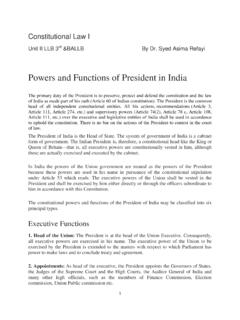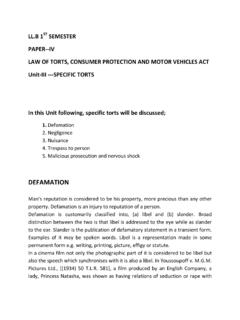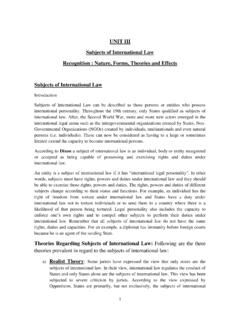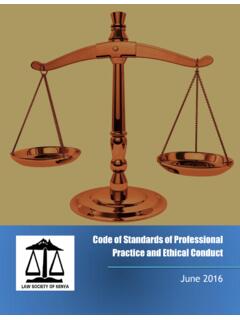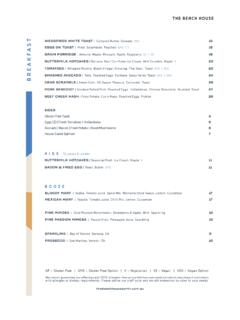Transcription of UNIT -3 BENCH BAR RELATION - University of Kashmir
1 UNIT -3. BENCH BAR RELATION . BENCH Bar RELATION : Bar- BENCH RELATION in law refers to the cordial relationship between the Advocates and the Judges. The Bar (Advocates) and BENCH (Judges) play an important role in the administration of justice. The judges administer the law with the assistance of the lawyers. The lawyers are the officers of the court. They are expected to assist the court in the administration of justice. As the officers of the court the lawyers are required to maintain respectful attitude toward the court bearing in mind that the dignity of the judicial office is essential for the survival of the society.
2 Mutual respect is necessary for the maintenance of the cordial relations between the BENCH and Bar. The opinion of our Supreme Court in the context of BENCH - Bar RELATION has been clearly laid down in Gupta v. Ram Murti and Others1 as follows: "A lawyer owes a duty to be fair not only to his client but also to the court as well as to the opposite party in the conduct of the case. Administration of justice is a stream which has to be kept pure and clean. It has to be kept unpolluted. Administration of justice is not something which concerns the BENCH only.
3 It concerns the Bar as well. The Bar is the principal ground for recruiting judges. Nobody should be able to raise a finger about the conduct of a lawyer. Actually judges and lawyers are complementary to each other. The primary duty of the lawyer is to inform the court as to the law and facts of the case and to aid the court to do justice by arriving at the correct conclusions. Good and strong advocacy by the counsel is necessary for the good administration of justice. Consequently, the counsel must have freedom to present his case fully 1. AIR 1998 SC 283.
4 And properly and should not be interrupted by the judges unless the interruption is necessary.". In Mahant Hakumat Rai v. Emperor2 the Lahore High Court had held that "Without failing in respect to BENCH , it is the duty of the members of the Bar to assert their just rights to be heard by the tribunal before which they are practising. They should be fearless and independent in the discharge of their duties, and would be perfectly right in protesting against irregular procedure on the part of any judge; and if the advocate is improperly checked or found fault with, he should vindicate the independence of the Bar.
5 He would be perfectly justified in insisting on getting a proper hearing and he would be perfectly right to object to any interruption with the course of his argument such as to disturb him in doing his duty to his client. Plenary powers vested in the Presiding Officer of the Court, apart from the fact that they have rarely been used against members of the legal profession so far, should only be used to vindicate the honour of the court or to satisfy the necessities of public justice and not as a matter of course." It may, however, be noted that the presence of professional etiquette coupled with recognition by judiciary of the importance of an independent Bar, will work together to minimise the possibility of confrontation between the BENCH and the Bar.
6 To conclude this part we can say that, a free and fearless Bar is not to be preferred to an independent judiciary, nor an independent judiciary to a free bar. Neither has a primacy over the other. Both are indispensable to a free society. The freedom of the Bar presupposes an independent judiciary through which that freedom may, if necessary, be vindicated. One of the potent means for assuring judges of their independence is responsible, well- behaved, cultured and, learned Bar. Finally, reciprocal adjustment of conduct by the BENCH and the Bar is the keystone to the smooth functioning of courts in general interest of the society.
7 2. AIR 1943 Lahore 14. Bar Council of India Introduction The Bar Council of India is a statutory body established under Section 4 of Advocates Act 1961 that regulates the legal practice and legal education in India. Its members are elected from amongst the lawyers in India and as such represents the Indian bar. It was created by Parliament under the Advocates Act, 1961. In March 1953, the 'All India Bar Committee', headed by S. R. Das, submitted a report which proposed the creation of a bar council for each state and an all-India bar council as an apex body.
8 It was suggested that the all India bar council should regulate the legal profession and set the standard of legal education. The Law Commission of India was assigned the job of assembling a report on judicial administration reforms. In 1961, the Advocates Act was introduced to implement the recommendations made by the 'All India Bar Committee'. and 'Law Commission'. In 1963, C. K. Daphtary became the Chairman and S. K. Ghose became the Vice Chairman. It prescribes standards of professional conduct, etiquettes and exercises disciplinary jurisdiction over the bar.
9 It also sets standards for legal education and grants recognition to Universities whose degree in law will serve as a qualification for students to enroll themselves as advocates upon graduation. FUNCTIONS AND POWERS OF BAR COUNCIL OF INDIA: Section 7 of the Advocates Act provides for the following statutory functions of the Bar Council of India: 1. To lay down standards of professional conduct and etiquette for advocates;. 2. To lay down the procedure to be followed by its disciplinary committee and the disciplinary committees of each State Bar Council.
10 3. To safeguard the rights, privileges and interests of advocates;. 4. To promote and support law reform;. 5. To deal with and dispose of any matter which may be referred to it by a State Bar Council;. 6. To exercise general supervision and control over the state bar council;. 7. To promote legal education and to lay down standards of legal education in consultation with the Universities in India imparting legal education and the State Bar Councils, With respect to this point, the Supreme Court has made it clear that the question of importing legal education is entrusted to the Universities in India and not to the Bar Council of India.



